The Power to Survive
Rosalie was a child soldier. She had no choice but to survive.
In the Democratic Republic of Congo, this is all too common for women like Rosalie, who come face to face with adversity and have their agency stripped away. There is only one option left, to survive.
“I was in the battlefield with my baby on my back.” - Rosalie
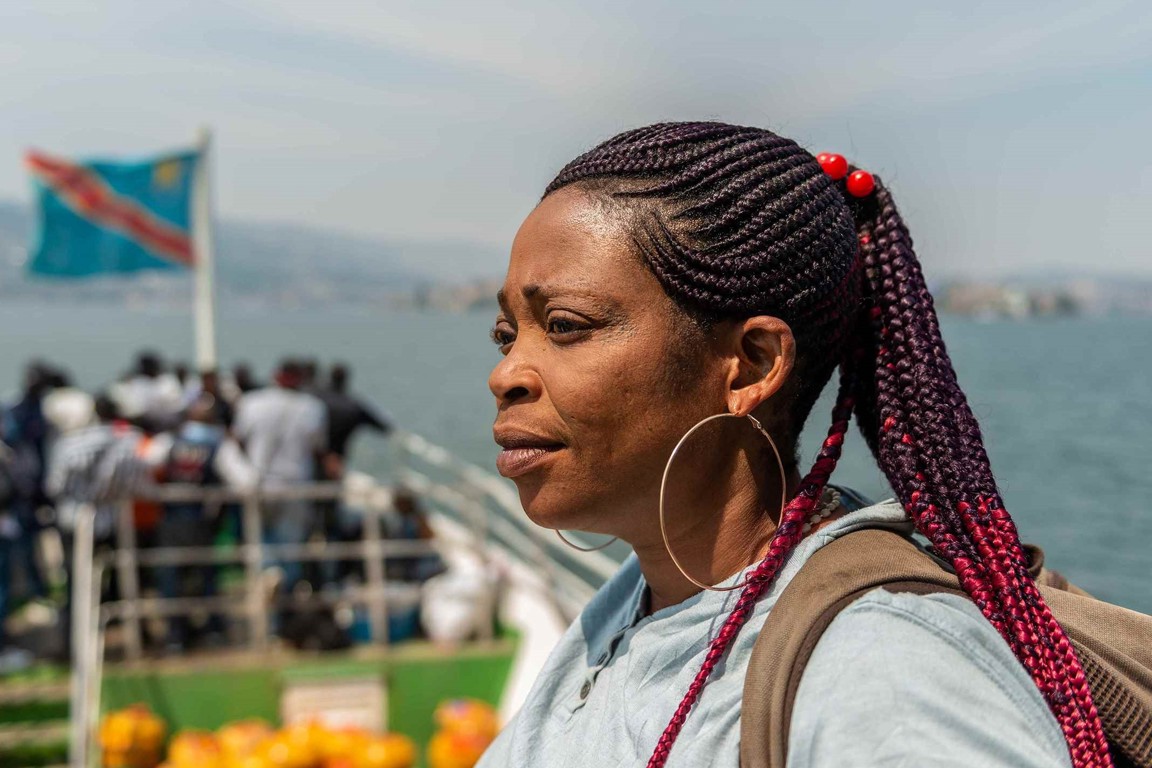
Rosalie looks out from the deck of a passenger boat heading back to Bukavu after buying shoes from a market in Goma, eastern Democratic Republic of Congo. Credit: Arlette Bashizi/CAFOD
Global Issues: what we can do to solve the biggest problems in the world
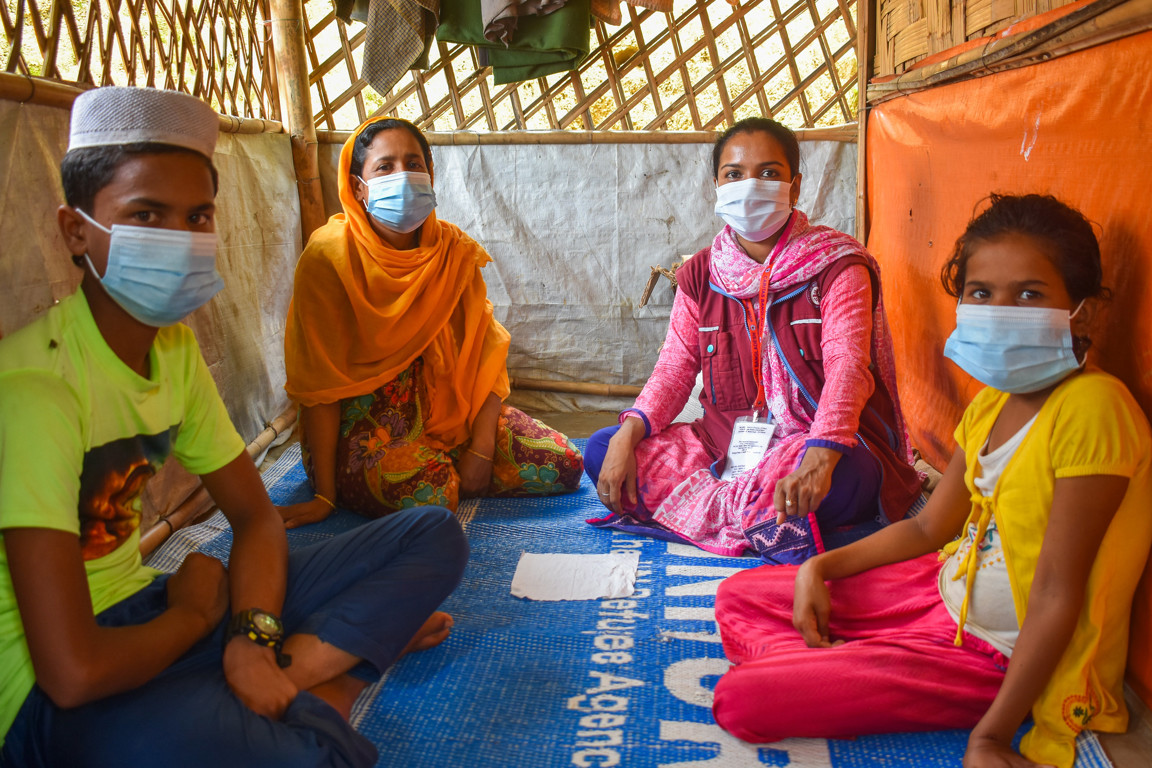
Didier (second from left) and her family receive COVID-19 training on how to wear a mask by Caritas Bangladesh case worker, Shara D'Silva, inside their shelter in a Rohingya refugee camp in Cox’s Bazaar region of Bangladesh in August 2020. Photo credit: Inmanuel Chayan Biswas/Caritas Bangladesh.
#WomenForTheWorld
Census Results
According to the latest Census results (2016), there is still a large gap in homelessness for First Nations Australians.
Conflict in Ethiopia and in Ukraine are affecting food security
Living with a disability in Vietnam
Imagine living in one of the most heavily bombed areas during the Vietnam War that is littered with thousands of unexploded ordinances (UXOs). This is the reality for many people who live Quảng Trị province, like Thu.
There are approximately 800,000 tons of UXOs that are left over from the Vietnam War. According to the Vietnamese government, there have been more than 100,000 civilian casualties from unexploded landmines.
“War is most terrible with great loss. At the end of the war, there are still consequences such as unexploded ordnance, causing many losses, casualties and death,” Thu says.
Over one billion people worldwide are estimated to experience a disability of some kind, equivalent to about 15% of the world's population.
Disability affects a significant portion of Vietnam's population, with over 6.2 million people living with a disability. An additional 13 per cent - nearly 12 million, live in a household with a person with a disability.
Households having members with disabilities tend to be poorer than the national average, and children with disabilities also are less likely to attend school. Adults with disabilities are less likely to be employed than their peers without disabilities.
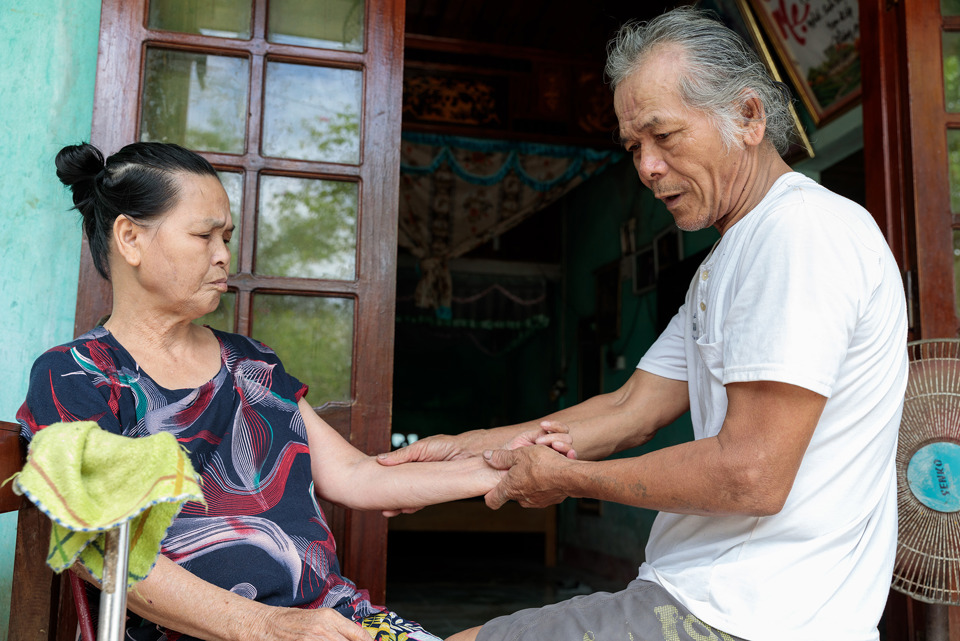
Thu helps his wife Linh, who suffered a stroke, with her rehabilitation at their home in Quang Tri province, Vietnam. Photo: Phan Tan Lam/Caritas Australia

Thu helps his wife Linh, who suffered a stroke, with her rehabilitation at their home in Quang Tri province, Vietnam. Photo: Phan Tan Lam/Caritas Australia
Living with a disability in Vietnam
Imagine living in one of the most heavily bombed areas during the Vietnam War that is littered with thousands of unexploded ordinances (UXOs). This is the reality for many people who live Quảng Trị province, like Thu.
There are approximately 800,000 tons of UXOs that are left over from the Vietnam War. According to the Vietnamese government, there have been more than 100,000 civilian casualties from unexploded landmines.
“War is most terrible with great loss. At the end of the war, there are still consequences such as unexploded ordnance, causing many losses, casualties and death,” Thu says.
Over one billion people worldwide are estimated to experience a disability of some kind, equivalent to about 15% of the world's population.
Disability affects a significant portion of Vietnam's population, with over 6.2 million people living with a disability. An additional 13 per cent - nearly 12 million, live in a household with a person with a disability.
Households having members with disabilities tend to be poorer than the national average, and children with disabilities also are less likely to attend school. Adults with disabilities are less likely to be employed than their peers without disabilities.
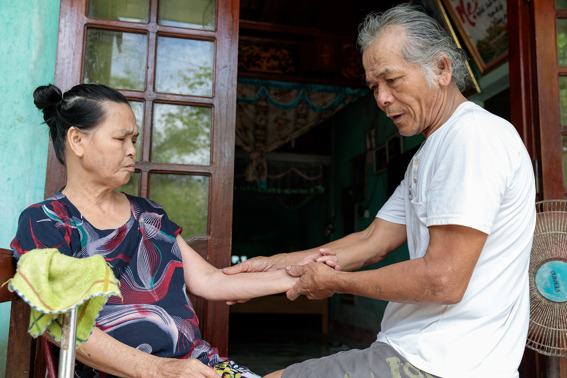
Thu helps his wife Linh, who suffered a stroke, with her rehabilitation at their home in Quang Tri province, Vietnam. Photo: Phan Tan Lam/Caritas Australia
Provide specialised rehabilitation devices and support for people living with disabilities
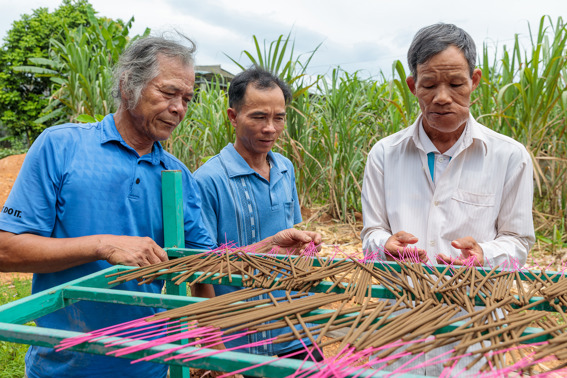
Thu (left) helps make incense sticks with fellow members of his VSLA (Village Savings and Loans Association) group near his home in Quang Tri province. Photo: Phan Tan Lam/Caritas Australia
Support the establishment of village savings and loans associations for people with disabilities to earn income
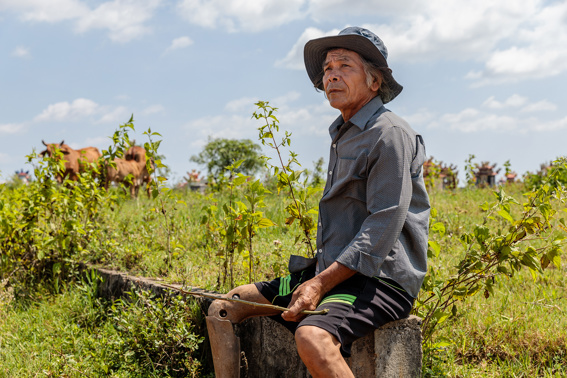
Thu looks after cows near his home in Quang Tri province, Vietnam. When Thu was 12-years-old, he lost his leg after stepping on an unexploded land mine whilst looking after his cows. Photo: Phan Tan Lam/Caritas Australia
Support people living with disabilities to participate in inclusive disaster and preparedness and resilience
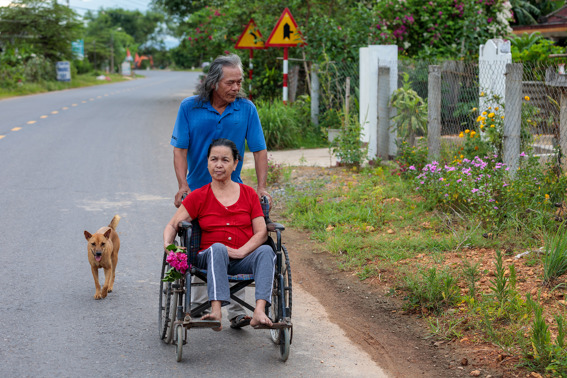
Thu and his wife Linh live in the Quang Tri province, Vietnam. After Linh suffered a stroke, Thu became her primary carer. Photo: Phan Tan Lam/Caritas Australia
Rural poverty
Over 75% of people living with a disability live in rural areas of Vietnam, where they are more likely to live in poverty.
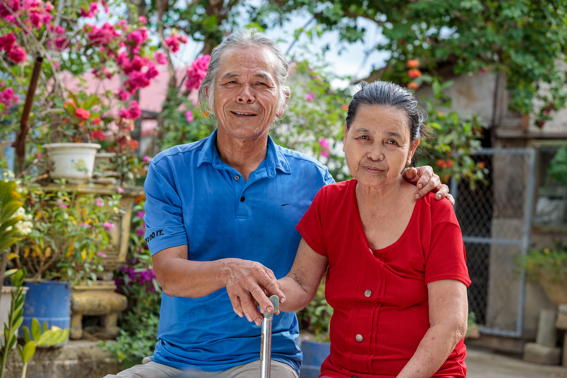
Thu and his wife Linh live in the Quang Tri province, Vietnam. After Linh suffered a stroke, Thu became her primary carer. Photo: Phan Tan Lam/Caritas Australia
Limited employment opportunities
People living with a disability may experience challenges in finding accessible jobs to boost their income.
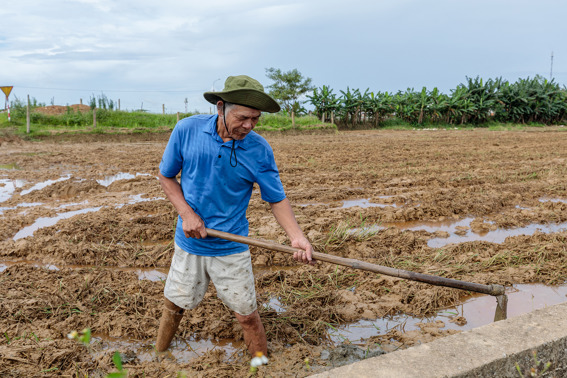
Thu works in his rice fields near his home in Quang Tri province, Vietnam. Photo: Phan Tan Lam/Caritas Australia
Lack of access to rehabilitation services
Only 2.3% of people living with disability have access to rehabilitation services when sick or injured
1 in 3 women
have experienced gender-based violence in their lifetime globally. Source: Worldbank.
Up to 52%
of women in DRC are survivors of domestic violence and 39% of Congolese women report having been threatened or injured. Source: Un Women.
Only 16.8%
of women have completed secondary school—about half of the rate of completion for men. Source: Worldbank.
Education and training
Gender equality and empowerment
Clean accessible water
Approx. 23,437
Aboriginal and Torres Strait Islander people were likely to be homeless on Census Night (1 in 28).
40%
of the Indigenous homeless population were children (aged 18 or under).
Video
Thu's story
Video
Thu's story
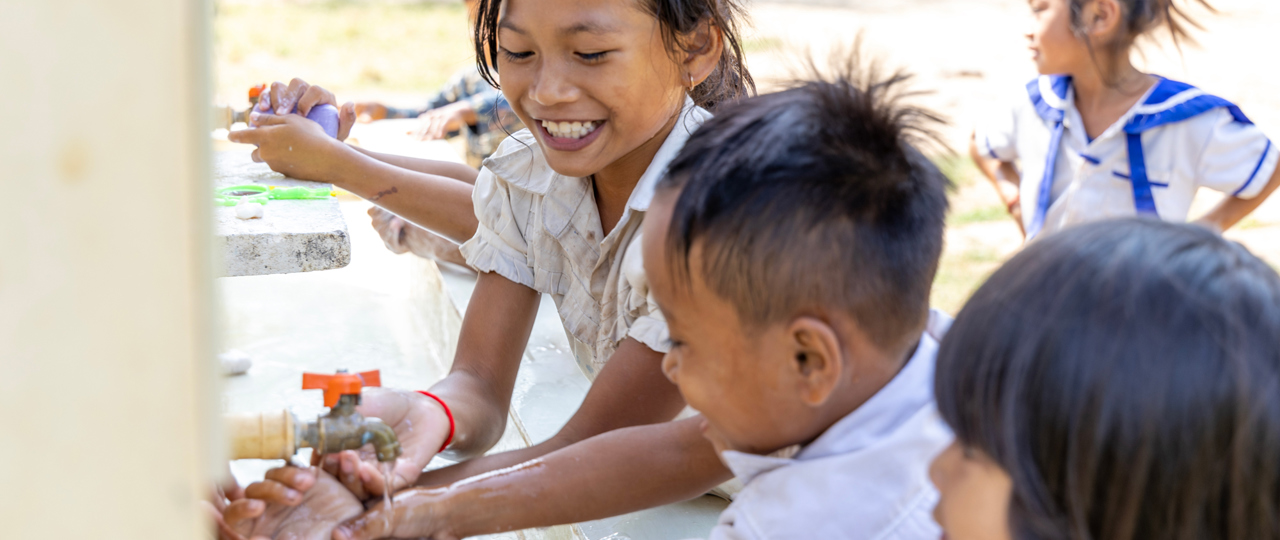
Students washing their hands at a school in rural Cambodia. Photo: Tim Lam/Caritas Australia
How lack of clean water traps families in poverty
2.2 billion people do not have access to safely managed drinking water, forcing them to experience a life of poverty.
Health and well-being are only possible with safe water and maintaining hygiene and sanitation practices.
The important thing to remember is that poverty is not a choice. With your support, we can help communities like Salin’s to create lasting change.
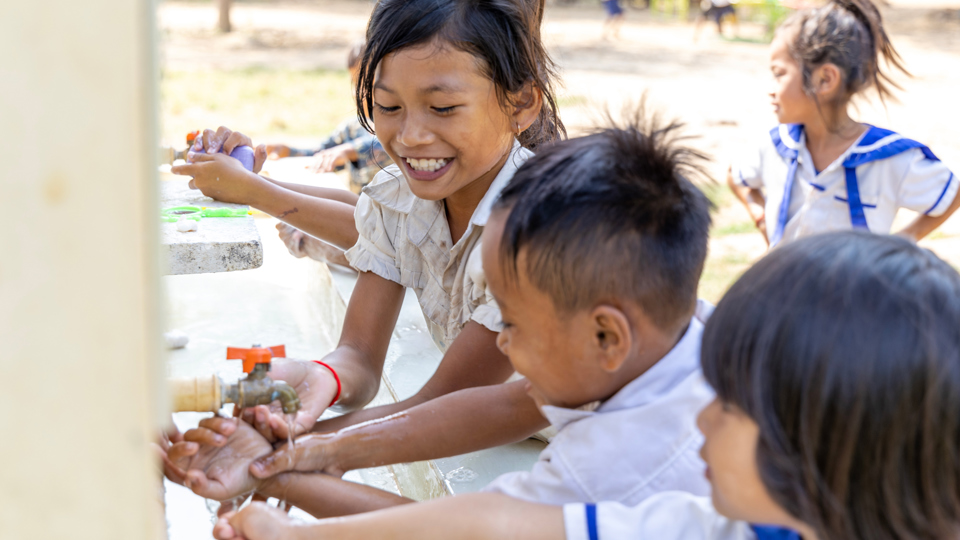
Students washing their hands at a school in rural Cambodia. Photo: Tim Lam/Caritas Australia
How lack of clean water traps families in poverty
2.2 billion people do not have access to safely managed drinking water, forcing them to experience a life of poverty.
Health and well-being are only possible with safe water and maintaining hygiene and sanitation practices.
The important thing to remember is that poverty is not a choice. With your support, we can help communities like Salin’s to create lasting change.
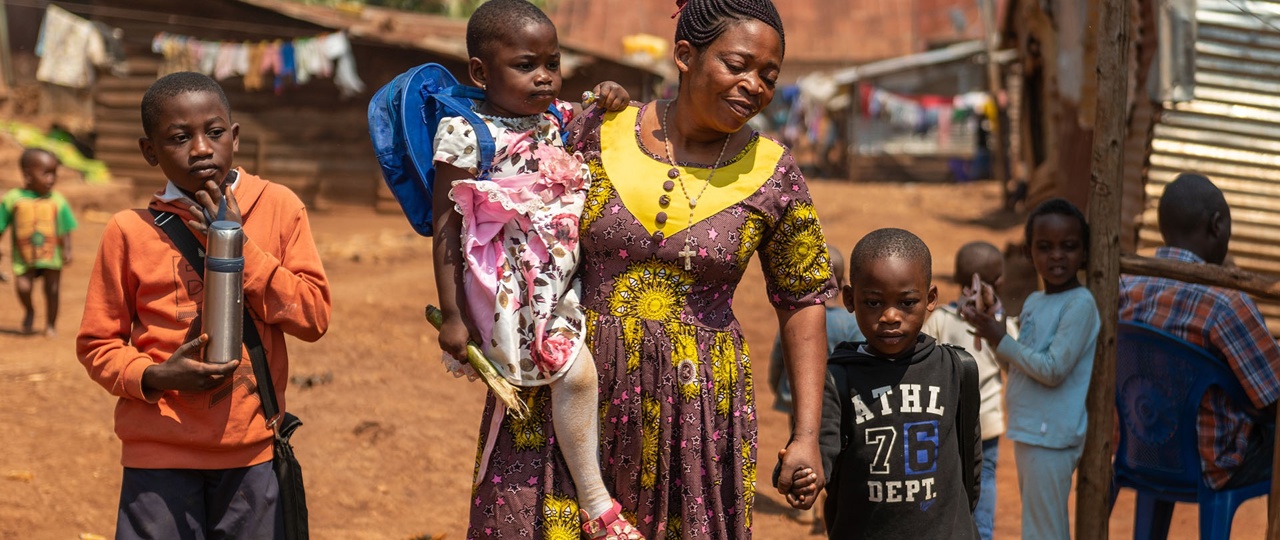
Rosalie outside home with some of her children in eastern Democratic Republic of Congo. Photo: Arlette Bashizi/Caritas Australia
Rosalie, Democratic Republic of the Congo
At the age of 15, Rosalie was forced to join the army. In recent decades, the DRC has experienced ongoing conflict, and the recruitment of child soldiers is all too common.
When Rosalie finally left the army after six years, she was eager to start a new life free from violence. But like many ex-combatants, Rosalie found adjusting to civilian life overwhelming. With her childhood cut short by the war, she missed out on developing skills that would help her to find secure employment.
Rosalie was able to participate in business and social skills training, supported by Caritas Australia’s partners, Catholic Agency for Overseas Development (CAFOD) and Caritas Bukavu. She also joined a saving and lending group, providing her with a loan to start her own small business.
Rosalie is now a business owner, a community leader and a role model for other ex-combatants seeking to readjust to civilian life. She is inspiring women to overcome the violence of the past and work towards a more peaceful world for future generations.
Along with your generous support, this program is also supported by the Australian Government, through Australian NGO Cooperation Program (ANCP).
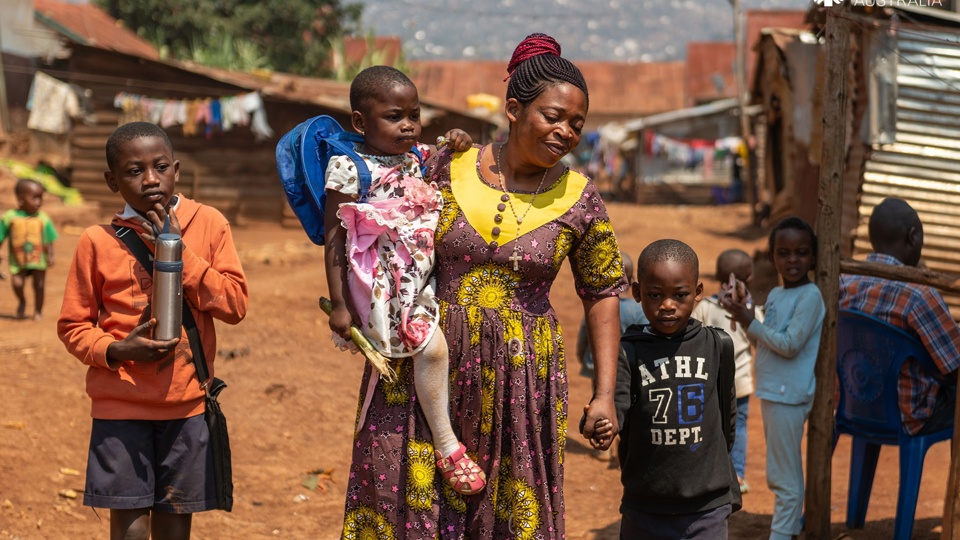
Rosalie outside home with some of her children in eastern Democratic Republic of Congo. Photo: Arlette Bashizi/Caritas Australia
Rosalie, Democratic Republic of the Congo
At the age of 15, Rosalie was forced to join the army. In recent decades, the DRC has experienced ongoing conflict, and the recruitment of child soldiers is all too common.
When Rosalie finally left the army after six years, she was eager to start a new life free from violence. But like many ex-combatants, Rosalie found adjusting to civilian life overwhelming. With her childhood cut short by the war, she missed out on developing skills that would help her to find secure employment.
Rosalie was able to participate in business and social skills training, supported by Caritas Australia’s partners, Catholic Agency for Overseas Development (CAFOD) and Caritas Bukavu. She also joined a saving and lending group, providing her with a loan to start her own small business.
Rosalie is now a business owner, a community leader and a role model for other ex-combatants seeking to readjust to civilian life. She is inspiring women to overcome the violence of the past and work towards a more peaceful world for future generations.
Along with your generous support, this program is also supported by the Australian Government, through Australian NGO Cooperation Program (ANCP).
“We have run out of food several times. I help my family with the farm, cooking, fetching water and firewood, and caring for my mother. I also assist my grandfather in feeding, as he has difficulty in picking up utensils due to blindness.”

Your donation can help:
Thank you for your support for Project Compassion – past, present and future!
Together we can help vulnerable communities face their challenges today and build a better tomorrow for future generations.
Lack of food security
Malnutrition can be caused by a lack of food security or unsustainable food production.
LACK OF INFRASTRUCTURE
Lack of proper health care infrastructure or insufficient health care professionals.
POOR SANITATION
Poor sanitation and hygiene facilities and lack of awareness.
ENVIRONMENTAL CHANGE
Environmental change, natural disasters, and the absence of effective risk management systems.
Planting drought-resistant seeds.
Cultivating long-life trees.
Water and soil conservation.
Training farmers in making organic fertilisers.
Your generous support today can help people like Rosalie to create a better tomorrow for their families and communities.
Along with your generous support, this program is also supported by the Australian Government, through Australian NGO Cooperation Program (ANCP).

















